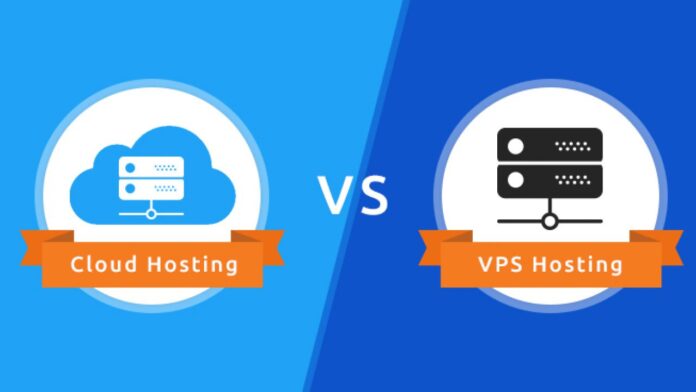Cloud and VPS hosting have their respective pros and cons. Read this article to understand the difference between them!
When choosing hosting for your site, you’ll probably consider either VPS or cloud. Shared hosting is cheaper but less secure and not suitable for scaling. In this article, we’ll try to compare cloud hosting vs VPS hosting. After reading this text, you’ll be able to make an informed decision on which type suits you best.
What Is Cloud Hosting?
This type of hosting relies on a cloud that consists of potentially unlimited virtual machines. Behind these machines, there is an underlying network of connected physical servers. Your site won’t be hosted on one machine or server. Instead, the resources will be spread out amongst various machines. Thanks to cloud server hosting, you’ll get access to nearly unlimited resources. As your business scales, your site will need to cope with more traffic and you’ll be able to use as many servers as you need.
What Is VPS Hosting?
This acronym stands for Virtual Private Server. Your site will be hosted on a physical server that is a part of a much larger server. All the smaller servers that the larger one is fragmented into operate independently of each other. You’ll get your own set of allocated resources. You’ll be able to configure and customize your server more flexibly than in the case of a cloud. On the flip side, your server might fail if the larger one that contains it goes out of order (which can’t happen with a cloud).
Let’s Compare Cloud Hosting vs VPS
Performance
VPS plans usually deliver very high performance. But on rare occasions, several sites hosted on the same server might face spikes in traffic simultaneously. In such circumstances, your site’s performance might temporarily deteriorate.
With cloud hosting, your site’s resources will be distributed between various servers. If one of them fails, it won’t affect your site’s performance. Plus, backups are built into the system. They will help your site to stay alive even if there is an issue with one of the servers.
Sites with good performance load quickly, are always accessible and operate as intended.
Security
Cloud hosting functions in an entirely virtual environment. That’s why it might be a bit more prone to hacking attacks. Top providers know how to resist such attacks, so your site should be unlikely to go down.
VPS might be slightly more secure since it relies on physical servers. However, some providers consider security to be their top priority while others put less effort into this aspect. To play safe, you should choose a provider for whom security is paramount.
Price
The cheapest type of website hosting is shared and the most expensive is having a dedicated server. Both cloud hosting and VPS belong to the medium price segment and don’t differ that much in cost. However, VPS plans normally feature fixed prices. With cloud hosting, your expenses might vary from one month to another depending on how many resources you consume (the more people visit your site, the more you pay).
Scalability
With VPS hosting, you receive a limited amount of resources. That should be fine for established businesses that are not planning to scale drastically. It can also be suitable for e-commerce sites that don’t experience seasonal demand fluctuations. If your site grows and requires more resources than your current plan offers, you’ll need to move to either a pricier plan or another provider. The migration will require time, effort, funds and technical skills.
If you expect your business to expand, sell seasonal goods or services or post content that might go viral, your site should be ready to handle occasional spikes in traffic. Cloud hosting is much better suited for this purpose than its VPS counterpart. A lot of servers will be available to you at any moment. Your site will always have high uptime and excellent performance.
Customization
The cloud technology enables you to configure and customize your hosting. But it might be tricky to do so because you’ll need to distribute the settings across multiple servers. That requires technical skills and knowledge.
VPS gives you root access to the server, pretty much like the more advanced and expensive dedicated hosting. You get control over the operating system and server software.
Even though the provider can impose certain limits on modifying the server’s configuration, VPS should be more customizable than the cloud.
To Sum It Up
The largest difference between the two types of hosting consists in their scaling capabilities. By all the other parameters, they don’t differ that drastically.
Who Should Opt for VPS Hosting?
Site owners typically consider switching to VPS after they realize the more affordable shared hosting can’t satisfy their demands anymore. You might want to use VPS if you meet the following criteria:
- Would like to customize your server settings
- Are planning to use a specific type of software on your site and need direct access to the server to install and maintain it
- Want to run custom scripts and plugins on your site
- Deal with higher traffic that shared hosting can handle — but this is consistent traffic without sudden spikes
VPS is perfect for those who have certain technical expertise and need more control over their site.
Who Is the Target Audience of Cloud Hosting?
Cloud hosting might be spot-on for you if you can tick the following boxes:
- Want to pay exactly for the amount of resources that you consume and don’t mind inconsistent billing
- Face seasonal fluctuations of demand for your goods or services
- Hope to scale your business in the next few years
Cloud hosting should be the best option in terms of flexibility and scaling.
Final Thoughts
Hopefully, you found this article informative and now you better understand the differences between cloud vs VPS hosting. The latter outdoes the former in terms of customization and security. Clouds have better performance and scale more easily. Both types of hosting feature more or less identical price tags — but with cloud hosting, you pay only for the resources that you consume while VPS plans have fixed prices.





